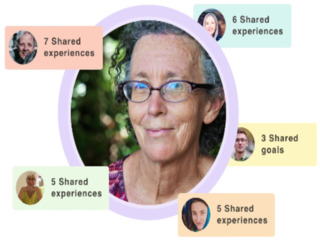Bambi Francisco Roizen speaks with Boaz Gaon, founder and CEO of Wisdo Health, a company and a movement dedicated to helping the 124 million Americans who say they are lonely. Wisdo’s approach – storytelling. Wisdo recently raised $5 million in venture financing.
Some takeaways –
– Boaz is a story consultant using the power of story, leveraging Aristotle’s Poetics. He talks about Aristotle’s technology (engineering approach to telling a story) that is based on six must-haves. This is whether someone is telling a story in a movie, or in a play, or about why their startup exists. Here are the components: Hero; Desire; Villain; Action; Suspense; End
- The hero in Wisdo’s story is the user who struggles to find people who can provide social support but then finds that support on Wisdo.
- 15:28 – Boaz talks about his journey in starting Wisdo from being a journalist whose father was diagnosed with cancer and who thereafter struggled with loneliness for eight years until he passed away.
- Traditional social networks were not built to increase levels of support. They were built to engage people to ultimately click on ads. Wisdo’s goal is to lower loneliness and illness. They are measured not by how many ads they sell, but how they can reduce or eliminate loneliness.
- Around 30% of members of Wisdo use an alias or a first name only. The rest use full names. Wisdo allows for anonymity to allow people to be more open and authentic to who they are and their journey. The challenge with anonymity, is it allows people to say things that make others uncomfortable and unsafe. To this end, Wisdo has safety measures in place to ensure safety for its members.
- Wisdo has a couple case studies (State of Colorado and Humana) showing that Wisdo reduced loneliness for 60% of the population. Anywhere between 15-20% of population falls below the loneliness scale (not lonely at all); Reduction in unhealth days; High engagement and satisfaction levels.
- The process of Wisdo: A person receives a baseline social health score; they are presented with communities representing a gap in that person’s support network. These communities are focused on a variety of conditions or situations, such as depression, anxiety, struggling with divorce, or stress at work. Once those are selected, Wisdo will ask more questions such as, “Are you suffering from sleep problems?” And a person answers “Been there” or “There now.” A person is then shown (in real-time) how many others in Wisdo have “been there” or are “there now.” This helps Wisdo understand who can help others and who needs help. Importantly, it helps the person signing up also see the number of like-minded people they can connect with. Wisdo also offers peer group sessions and coaching sessions.
- Wisdo’s approach is unique because it allows people to use the peer network to develop skills of self-worth and belonging to enable them to work through their loneliness. Other solutions rely on therapists to tell patients how to work through their loneliness versus peers who are helpful just by listening.
Thank you to our sponsors: Advsr; a boutique M&A advisory firm. They wrote the book on startup M&A called “Magic Box Paradigm: A framework for startup acquisitions.” Go to Amazon.com to get your copy. Also thanks to Stratpoint, an outsourced engineering firm and Scrubbed, an online bookkeeping firm. If you need affordable and quality engineering and bookkeeping, check them out. We highly recommend them!
Subscribe to our podcasts to get our interviews and shows as soon as they’re published!
















